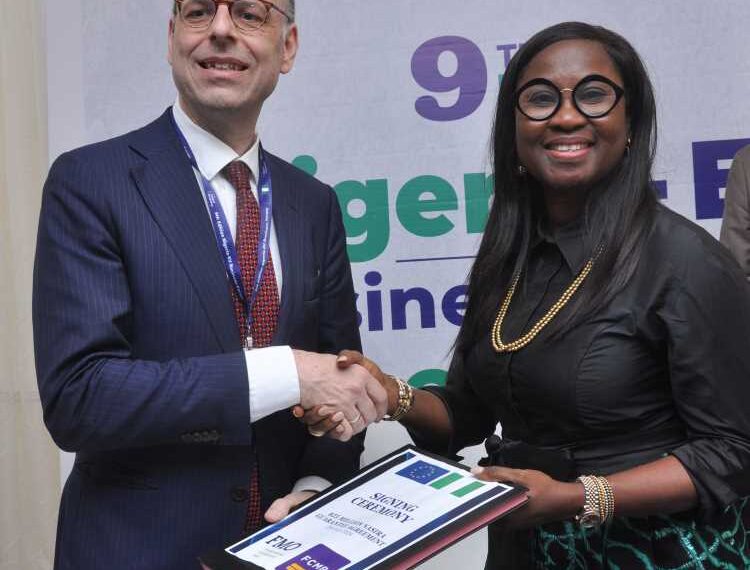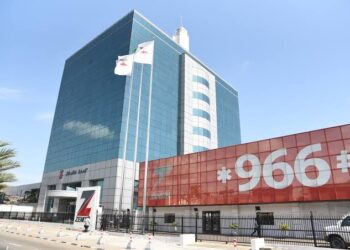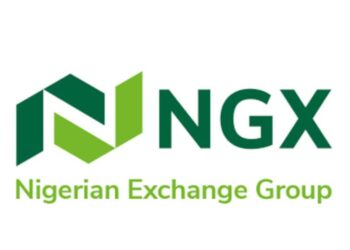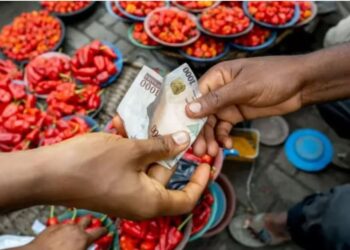Today, the Dutch Entrepreneurial Development Bank (FMO) and Nigeria’s First City Monument Bank (FCMB) signed a $25 million NASIRA guarantee agreement. The guarantee will enable FCMB to expand its funding to agricultural, youth, and women-owned SMEs without requiring collateral, targeting a client group typically deemed too risky by banks.
Funded by the European Commission, NASIRA is one of FMO’s most innovative programs, encouraging local banks to extend their funding to small entrepreneurs without collateral. Often, the FMO guarantee – that effectively replaces the collateral – is not fully utilized, demonstrating that these entrepreneurs, primarily women and young people, are not riskier than others.
Job creation in Nigeria, home to 220 million people and the largest population in Africa, is critical. The country faces severe economic challenges, including high unemployment and a significant 70% depreciation of its currency over the past year. Providing small loans to typically high-risk groups will enable them to start and expand their businesses, offering a means of income for themselves and their families.
In addition to the USD 25 mln NASIRA guarantee, FMO will support FCMB with a syndicated loan of USD 60 million: USD 20 million through FMO, USD 30 million through the European Financing Platform on behalf of BIO, DEG, EIB, FINNFUND, Proparco, and SWEDFUND, and USD 10 million through FMO Investment Management. The loan is dedicated to growing the existing FCMB loan portfolio of small and medium-sized entrepreneurs (SMEs).
Speaking during the signing ceremony at the side-lines of the 9th Nigeria EU Business Forum, the EU Ambassador to Nigeria and ECOWAS Ms. Samuela ISOPI said “We are very happy to see that the EU investment instruments, such as the European Fund for Sustainable Development (EFSD+) guarantees, have come to Nigeria to play a catalytic role in leveraging private sector investments for the benefit of the real sector, economic diversification and employment creation, especially for youth and women”. The transaction also contains a technical assistance (TA) program.
Through this TA initiative, FCMB and FMO will select and support 15 scalable early-stage agri-tech businesses in Nigeria. Together, FMO and FCMB will identify 15 disruptive business models that address pressing problems in the agricultural sector, contributing to SDG2: zero hunger and food security.
About NASIRA
Launched in August 2020, NASIRA is a collaborative effort supported by the European Commission and the Dutch government. To date, it has facilitated 17 transactions with financial institutions across Central Europe, the Middle East, and Africa, amounting to a total of USD 371 million. For more information, please visit www.fmo.nl/nasira
About FMO
FMO is the Dutch entrepreneurial development bank. As a leading impact investor, FMO supports sustainable private sector growth in developing countries and emerging markets by investing in ambitious projects and entrepreneurs. FMO believes that a strong private sector leads to economic and social development and has a 50+ year proven track-record in empowering entrepreneurs to make local economies more inclusive, productive, resilient and sustainable. FMO focuses on three sectors that have high development impact: Agribusiness, Food & Water, Energy, and Financial Institutions. With a total committed portfolio of EUR ~13 billion spanning over 85 countries, FMO is one of the larger bilateral private sector development banks globally. For more information: please visit www.fmo.nl
About FCMB
First City Monument Bank, a part of FCMB Group Plc, is committed to fostering inclusive and sustainable growth within its communities by building a supportive ecosystem rooted in Africa (primarily Nigeria), connecting people, capital, and markets.
About EFSD+
The European Fund for Sustainable Development (EFSD+) is one of the financing tools of Global Gateway, promoting sustainable investments in the European Union’s (EU) partner countries.. By leveraging public funding to attract private investments, the EFSD aims to foster sustainable development, create jobs, and address root causes of migration. It supports projects in critical areas such as renewable energy, infrastructure, digitalization, and small and medium enterprises (SMEs), utilizing financial instruments like guarantees and blending to de-risk investments and promote economic growth and stability.












